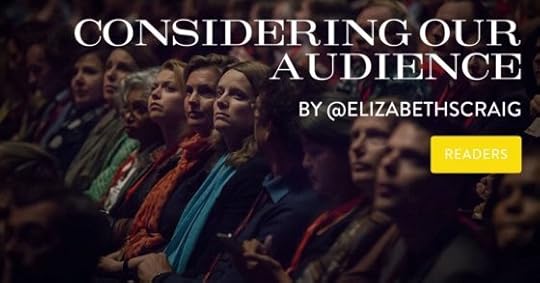Considering Your Audience
by Elizabeth S. Craig, @elizabethscraig
When I was a kid, there was one part of Cinderella that baffled me.
The clock struck midnight and Cinderella, in a panic, cries out that it’s late and that she must leave.
The handsome prince responds, “But it’s not late; it’s only midnight.”
Only midnight. To a four or five year old me, this pulled me right out of the story. I’d never even witnessed midnight. To someone who turned in at eight o’clock, this seemed like an outlandish thing for the handsome prince to have said.
I frequently read on blogs that considering our readers is very important. But how do we know who our audience is? And what does it mean to keep them in mind as we’re writing?
Who is your audience?
At first, I’d consider other books in your genre. What part of the reader segment is the writer or publisher pursuing? The cover can be a good clue. Does the cover show an action scene? A romantic scene? What are the ages of the characters on the cover, if there are people depicted there? In terms of the content, you could ask the same questions. What’s the focus and pace of the story? How much profanity is used?
If you can’t tell from the cover and content of books similar to yours, take a look at the authors’ followers online.
It’s also helpful to ask yourself who your ideal reader is. Who are you specifically writing for?
And, as you take notes on books that are similar to yours, it’s good to have a grasp on the genre and subgenre that you’re writing in.
Connecting with readers
It’s important to have ways for readers to contact you. Of course you want to have your email address available for them, but it’s also helpful to have some sort of means for them to connect with you online. You don’t have to be on all the social media platforms (in fact, being on all of them is probably a bad idea….it’s just nearly impossible to keep up with), but there needs to be one at least for them to follow you on. As you write more books and have more followers on social media, you can actually see who your reader is…their ages and gender.
Writing for your audience
Once you know who your reader is, it gets a lot easier to write for them. That’s because readers will have certain expectations for the types of books that you write. If you aren’t sure of those expectations, just read more books in your genre.
For further reading, see Angela Quarles’ post at Fiction University, “Finding Your Audience” and Dan Blank’s post at Writer Unboxed, “Do You Know Who Your Reader Is? No, Really: Do You?”
What do you know about your audience? How do you keep them in mind as you write?
Considering Our Audience, as Writers:
Click To Tweet
Photo credit: TEDxAmsterdamED on VisualHunt / CC BY
The post Considering Your Audience appeared first on Elizabeth Spann Craig.




